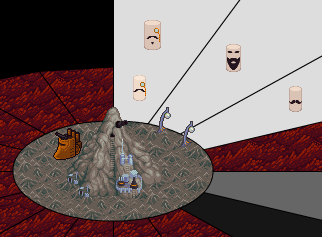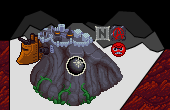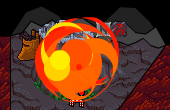
|
< 13 Trade | Index | 15 Warfare > 14 Espionage Once you know who your neighbours are, wouldn't you love to get a little closer to their city and see what's going on?
Once you know who your neighbours are, wouldn't you love to get a little closer to their city and see what's going on?
Espionage is an integral strategic component of player interactions in Battle Mines. The spies you dispatch use refined glass observational equipment, drifting about invisibly like the desert sand. For a very low investment you get the latest information on your opponent and a continuous source of income from your spy's racketeering. For a healthier sum you can cause all kinds of mischief, or engage in diplomacy (which is really just spying out in the open). Remember, neighbours you can't see are able to work espionage on you with an outpost in place. Don't get left behind, corruption works best in both directions. 14.1 SpiesThere are three levels of spy in Battle Mines: The informant, the operative, and the diplomat. All share certain properties, all have special abilities. Only informants are available at the start of the game, agents and diplomats must be researched in the academy. Informants and operatives are collectively known as field agents.
Spies can be dispatched to any visible neighbour, as long as their border is not closed. Dispatches and upgrades are blocked by closed borders. Upgrades to existing spies are not possible unless the target land is visible, but invisible lands will become named on the map if they host a spy. Informants are your basic, green spy recruit. Operatives have a little more chutzpah. These two lower-level spies hide themselves in the buildings of the enemy city. From there, they are safe to transmit information back to headquarters. Unfortunately, if the building they are hiding in is destroyed, the spy is slain. Any time a building is lost by combat or random events, there is a chance for any field agents hidden in the city to be killed. Naturally, the less buildings a victim has, the riskier it is for spies. If the player ever loses all their buildings, all informants and operatives will be forced to return home whether they are killed or not (reimbursing some sand). You cannot dispatch spies to a player with no buildings. The top level spy, the diplomat, casually walks up and knocks on the door of his host, getting invited in for brandy and cigars. Foreign ambassadors are housed in an excellent enclosure on the upper battle promenade, able to dine and court intrigue incessantly, while being easily located for executive termination. They are fully excluded from the incessant ducking and dodging between buildings endured by their brethren in the field. All dispatched spies and hosted diplomats count as contact for purposes of global combat. 14.1.1 InformantAn informant costs just one glass to dispatch, and is your bread and butter for spying at the start of the game. They boast all the reporting and corruption capacity of the more expensive operative; the downside is they tend to get themselves killed a little sooner.Informant attributes:
Informant abilities:
Informant missions: 14.1.2 OperativeThe operative upgrade, at a cost of two glass, equips your existing field agent with a laser gun, cloaking device, and mind control unit. This enables advanced spy missions, and renders him more likely to survive: Operatives receive a 50/50 chance of escaping death in any situation that would be fatal for a mere informant.Operatives are not available at the start of the game, the Bladerunning technology must first be researched. Operative attributes:
Operative abilities:
Operative missions: 14.1.3 DiplomatIn achieving diplomat status, the long-serving agent finally sloughs off his field gear, pops his feet up on the sofa, and rings for a nice bit of battenburg. Yes, it's all foreign affairs work from here on in, but heaven forfend the host countries should not get along.Upgrading an operative to a diplomat is free of charge, once the requisite technology has been researched. This is offset by the fact that diplomats on both sides are executed whenever war breaks out. Thanks to their covert training however, diplomats receive a 50% chance of escaping the axe to become operatives once again. For communist diplomats, this chance is increased to 100%. As well as fulfilling the usual spy roles, diplomats also exercise their ambassadorial muscles to completely block any attempt at land exchange or land push, by either host or master. On top of all this, diplomats also make their presence felt in the global political arena. With a diplomat on either side, contact is preserved between globally mobile players, ensuring they can engage in combat even when their lands drift apart. Players cast additional votes towards all issues in the senate (except speaker) based on how many vassals or diplomats they have, whichever is less. See The Senate for more details. Diplomats are not available at the start of the game, the Foreign Affairs technology must first be researched. Diplomat attributes:
Diplomat abilities:
Diplomat missions: 14.2 Spy AbilitiesAbilities shared by all spies, these are the main perks that come with your empire's top notch espionage service.14.2.1 Inventory reportBy snooping around the city grounds and a few twisty turny corridors of the battle mine, spies can give a rough estimate of some important objects in their host's inventory. Your spy will tell you:
Communist spies also report the presence of palantirs and ICBMs. This information is available on the player profile. 14.2.2 City ViewLinked in the sidebar from the player profile, the city view lets you investigate your neighbourís building arrangement, complete with building manifest for easy assessment.From this information, your spy is able to surmise combat accuracy and other details back on the player profile. The spy will also report whether the victim is able to return fire or not, revealing the presence of a perma-cannon if this is the pivotal factor. 14.2.3 CorruptionCorruption is caused primarily by field agents, and can supply a steady stream of useful objects to the intelligent commander. It involves occasionally skimming one of the victim's most plentiful objects before returning it to the home inventory. Under the right circumstances, even diplomats can get in on the game.With only a small success rate of 10% every 4 hours, corruption may seem a minor income boost at best, but added up across an entire espionage network the proceeds become nothing to sneeze at. The maximum chance of corruption (for each spy) is 100%, so only one object can be stolen at a time. Corruption is affected by many game elements, outlined here. Later modifiers take precedence over earlier ones.
Corruption is completely shut down if a player has less of their most plentiful object than they do spies trying to take it away from them. Essentially the stockpile gets so small, it becomes easy to guard. This overrides all other effects. 14.3 Spy MissionsSpy missions are ways that your various crew can cause trouble for their host. These can be a useful alternative or compliment to more direct hostilities. Spy missions cannot be performed if either you or your victim have closed borders.Apart from smuggling palantirs, all spy missions generate +20 juice instead of the usual +1 per action. 
14.3.1 Smuggle PalantirAny type of spy is able to perform this simple mission risk-free, that of smuggling a palantir into the host's inventory. They will immediately be notified of the event. Note that you are only able to smuggle your own palantirs. See the Palantirs section for more details.14.3.2 Suicide Bombing
14.3.3 Sabotage This mission is a dangerous one reserved for operatives alone. It has an unavoidable chance of failing outright, and your spy must cheat death twice to come out alive.
This mission is a dangerous one reserved for operatives alone. It has an unavoidable chance of failing outright, and your spy must cheat death twice to come out alive.
At a cost of one enriched uranium for the bomb, plus three diamonds to pay off the guards, your agent will attempt to cause an enriched uranium blast in their host's city. Not only that, you get to choose the quarter of the city (north, south, east or west) in which the explosion will happen. There is a 50/50 chance your agent will be caught before he can trigger the explosion. If the enemy catches your operative, it is game over for the poor fellow. Captured communist and syndicalist agents have a 50/50 chance of escaping execution, but the sabotage attempt will still fail. Your identity will be revealed, and the IWI will confiscate half your uranium (ore and enriched, rounding up). If your agent evades capture, the bomb will be detonated at a random location in the selected quarter of the city. If the target neighbourís city size is of odd width, the centre line of the city will be counted as part of the target area. Parts of the explosion may spread to other quarters, but the main point of detonation will be inside the quarter you specify. At this point, your agent has another 50/50 chance of dying, or escaping the blast to serve another day. Communist and syndicalist agent survival odds are once again doubled. Regardless of the outcome of a sabotage attempt, the victim will be made aware of the plot, and correspondingly close their borders to avoid further unwanted attention.
By feeding his people two food, you can change the target's government to anything except anarchy or theocracy. If the target's current government hates the government you are revolting them to, the cost is three food. It costs a whopping 4 food to incite a revolt to syndicalism (but chapter 2 of the plot points is not a restriction). If the target owns a church, then theocracy becomes an option for the revolt. This may result in city size shrinkage because of tech loss, and thereby building loss. See Tech Level for details. If the black horseman rides, anarchy becomes an option. This mission always succeeds, but your operative has a 50/50 chance of being killed in the uprising. If the victim's people are too full to eat the food, the mission cannot begin and you will be notified. 14.4 PalantirsPalantirs, once smuggled to your enemies, become a useful tool of control. Before exploiting them however, you must be aware of how this most peculiar of objects functions.Palantirs are manufactured in a factory for one glass, and take up one space in your inventory. They cannot be traded, tithed or overflowed. Due to their mysterious power, if two palantirs are ever in the same inventory at once, both will disintegrate. If someone smuggles their palantir to you, destroy it simply by manufacturing your own, or wait until someone smuggles another to you. If you are holding your own palantir, you are not permitted to start manufacturing another one. The strange magic of the palantir even prevents you from creating more than one at once, and they cannot be rushed like other production objects. Factories that are finished producing palantirs will not leave them behind in rubble if they are destroyed. Once your palantir is manufactured and harvested, it appears in your inventory with your name on it. You then have the option of smuggling it to any enemy you are spying on. They will be notified of the event. A player holding your palantir is affected in these ways: Additionally, if you are holding your own palantir, you receive an extra detailed report on any player who is also holding one of your palantirs. When you try to smuggle a palantir, if the target is already holding one, both with be destroyed (as described above). Smuggled palantirs count as contact for purposes of global combat. The player with the most untied palantirs in the world is made a leader, the watcher in the deep. < 13 Trade | Index | 15 Warfare > |
